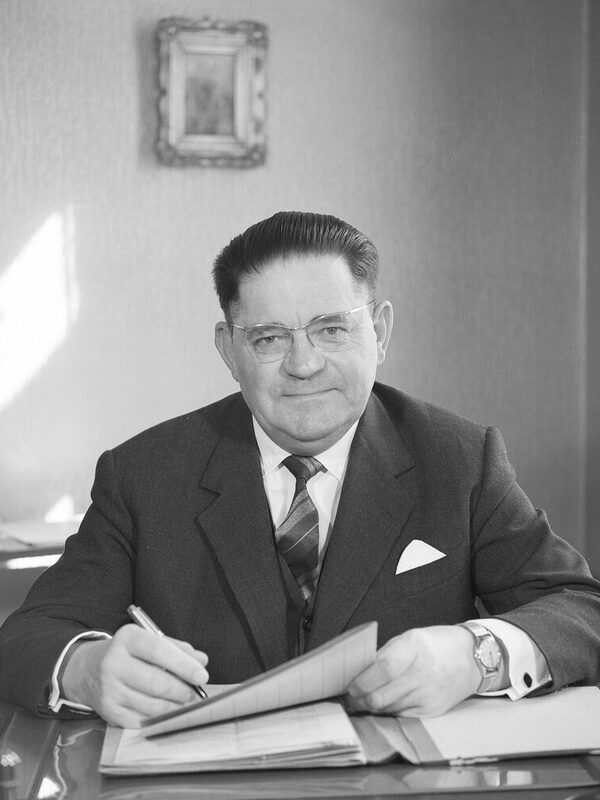Book, Georg
Book, Georg
Typesetter, resistance fighter, parliamentarian, Lord Mayor, President of the State Parliament
Born: 24.09.1903 in Wiesbaden
died: 05.08.1995 in Wiesbaden
The son of a single mother who made a living for herself and her two children as a housemaid and sales clerk respectively, he completed an apprenticeship as a typesetter after attending the Blücher School, which he completed in 1921 with a journeyman's examination. Having already joined the youth organization of the Association of German Book Printers in 1919, he also joined the Workers' Youth League, the predecessor organization of the Socialist Workers' Youth (SAJ), the following year. From 1921, he acted intermittently as the local chairman and youth leader of this SPD organization. He also became a party member in 1921.
Over the next few years, he worked for various printing companies, sometimes only on a temporary basis, which was followed by a long period of unemployment that lasted until 1933. From 1928, he worked as head of propaganda for the Wiesbaden SPD. From 1929 to 1930, he attended the Frankfurt Academy of Labor. In May 1933, he was elected chairman of the Wiesbaden-Alt SPD. This gave him the task of leading his party into the illegality imposed on it by the National Socialists. Shortly before this, he had become a city councillor by succession, but this had no political consequences.
In the fall of 1933, Buch was taken into "protective custody" for two weeks in the Gersdorff barracks. Nevertheless, he defied the "Third Reich" as the leader of a local resistance group made up mainly of younger, mostly female SAJ and SPD members. Richard Otto, the long-time managing director of the Wiesbaden SPD sub-district, and his wife Emma also took part in these activities. While Buch soon completely sealed off his group from the outside world for security reasons, he maintained political contacts with a number of other like-minded people in Wiesbaden, including Johannes Maaß and Moritz Lang, completely independently of this.
He also maintained conspiratorial contacts in his immediate and more distant surroundings, for example with Willy Knothe, who led the SPD resistance throughout southwest Germany from Frankfurt until his arrest in the summer of 1934. Buch continued to keep his own anti-Nazi circle of friends together unwaveringly. After initially earning his living through a mobile coffee trade, he opened a sales agency for household articles in 1935, and later also for food. From 1940 onwards, he worked for a company specializing in impregnation, where he was eventually deployed as a group and construction manager in the Western France Air District with a base in La Rochelle.
Triggered by a denunciation, he was arrested there in the spring of 1941, after several of his comrades-in-arms had already been imprisoned. As an "authoritative intellectual leader of the illegal Wiesbaden SAJ group", Buch was sentenced to two and a half years in prison by the Kassel Higher Regional Court on March 13, 1942. After serving his sentence in the Frankfurt-Preungesheim and Hanau prisons, he was sent to Hinzert concentration camp from March 1944 and Sachsenhausen concentration camp from July 1944. He was liberated there the following spring.
From the summer of 1945, he was active in various leading positions in local and state politics, for example as temporary managing director of the Wiesbaden SPD, as chairman of its city councillor faction and its sub-district. In 1946, he was finally able to marry his fiancée of many years, Anna Ebert, who gave birth to their daughter Marianne in 1949. Also in 1946, Buch was a member of the constitutional advisory assembly of Greater Hesse.
From the same year until 1954, he served as head of the Department of Economics and Food of the state capital Wiesbaden, as its mayor from 1954 to 1960 and as Lord Mayor from 1960 to 1968. From 1946 to 1950 and from 1954 to 1974, he was a member of the Hessian State Parliament, of which he also served as President from 1966 to 1974. He was also a member of the SPD district executive of Hesse South and the SPD state executive of Hesse from 1945 to 1970, deputy chairman of the SPD district of Hesse South from 1954 to 1962, chairman of the SPD state parliamentary group from 1959 to 1960 and then deputy chairman until 1966. From 1971 to 1980, he served as Chairman of the Board of Trustees of Indivisible Germany, Hesse State Board of Trustees.
Buch was also committed to our democracy in many other honorary roles, for example as a member of the Presidium of the Sachsenhausen Committee for the Federal Republic of Germany and as part of his party's work with senior citizens. He received numerous honors for his commendable work: in 1968, he was made an honorary citizen of the state capital of Wiesbaden. In the same year, he was awarded the Wilhelm Leuschner Medal of the State of Hesse. This was followed by the Grand Cross of the Order of Merit of the Federal Republic of Germany in 1973 and the Grand Cross of the Order of Merit with Star and Shoulder Ribbon in 1978. The funeral service, jointly organized by his native city and his home state of Hesse, took place on August 10, 1995 in the Kurhaus (Kurhaus, new). Buch was laid to rest next to his wife Anna in the North Cemetery. The community center Gewerbeschule in Wellritzstraße and the house of the Arbeiter-Samariter-Bund, Landesverband Hessen, in Bierstädter Straße both bear the name Georg-Buch-Haus. Georg Buch's estate can be found in the Wiesbaden city archives.
Literature
- Emig, Erik
Georg Buch. The life and work of a social democrat. Bonn 1983.
- Ulrich, Axel
Georg Buch. September 24, 1903 - August 5, 1995. 100th birthday. Magistrate of the State Capital Wiesbaden, Cultural Office - City Archive (ed.), Wiesbaden 2003.
